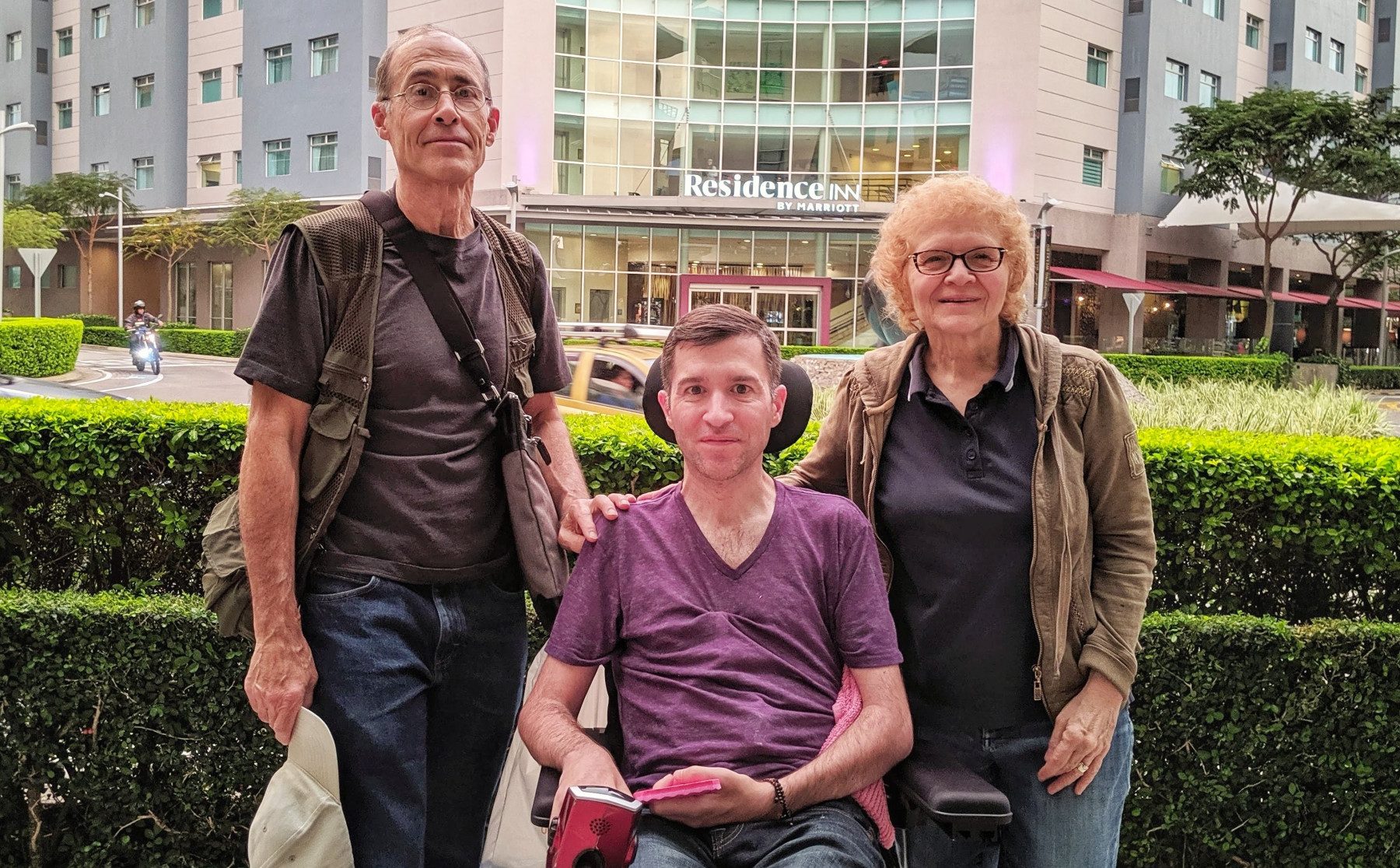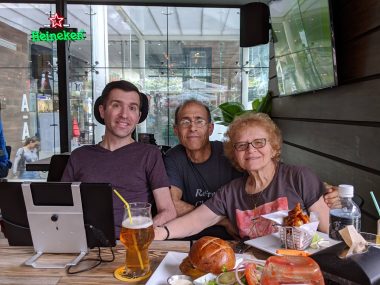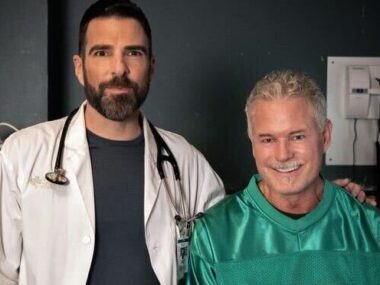‘Never Say Invisible’ Keeps Man’s Fight With ALS, Wider World Going
Written by |

Fred, Jeremy, and Ronnye Schreiber during a family trip to Costa Rica. (Photo courtesy of Ronnye Schreiber)
Shortly after Jeremy Schreiber, then 39, was diagnosed with amyotrophic lateral sclerosis (ALS), he had another life-altering decision to make.
“I had a choice — climb into bed and pull the covers over my head or say ‘[expletive] it’ and fight this thing head-on,” Schreiber wrote in an excerpt from his upcoming book, “Never Say Invisible,” which recounts his experience with ALS and the difficulties of living in a world not designed for those with disabilities.
Schreiber died of ALS in October 2021, a day short of his 42nd birthday. But his legacy will remain through his words, which he typed using text-to-speech and an eye tracker. He started the book in 2018 within six months of his diagnosis, losing the ability to type with his eyes in mid-2021 before he could completely finish it, his parents, Fred and Ronnye Schreiber, said.
His parents are working with Sandra Jonas Publishing, a company that signed with Schreiber before his death, to get the book edited, finalized, and on shelves. It is expected to be available this spring.
His experiences in “Never Say Invisible” touch on the range of difficulties people with disabilities face because society overlooks them, according to Fred Schreiber, 73.
“It doesn’t matter where you go, the sidewalks are not made properly, and the doors aren’t wide enough, and so that’s really what he’s talking about,” Ronnye Schreiber, 70, who lives in New Jersey with her husband and owns a conference business, said in a video interview with ALS News Today. “It’s really important for him to get the word out so that people start to listen, and say ‘well, we’re people too, and we’re not invisible.’”

Jeremy, Fred, and Ronnye Schreiber pose for a photo at a restaurant in Costa Rica. (Photo courtesy of Ronnye Schreiber)
Schreiber advocated for the disabled and ALS community as much as he could, regardless of eventually having to use a power wheelchair, being unable to speak, and relying on 24-hour assistance from a caregiver.
He was invited to attend the ALS Association Advocacy Conference in Washington, D.C., during the summer of 2019. There, he and a delegation from several ALS Association chapters lobbied successfully for Congress to end a rule that forced people with ALS to wait five months before receiving Social Security Disability Insurance benefits. Schreiber also testified in front of the New Jersey State Legislature and asked for more money to be allocated to ALS research.
“You have to ditch your pride and ask for what you want or need,” Schreiber said via his computer in a March 2021 interview promoting the book. “Advocacy must be a central theme in your life. Advocate for yourself, advocate for your loved one and advocate for what you feel is right.”
While facing a myriad of physical symptoms, he started a blog that shares his book’s name. Topics ranged from designing an accessible home (Schreiber’s parents added an accessible wing, complete with an elevator) to medical marijuana and creating a self-care plan.
Before his ALS diagnosis, Schreiber enjoyed climbing, biking, sailing, snowboarding, and running marathons. He was a salesperson for companies that included GE Healthcare, Oracle, and Perfecto Mobile, which tests web and mobile applications, according to his LinkedIn profile. He traveled often and enjoyed the finer things in life.
“He savored every minute,” his friend Julie Cohen said at his memorial service in November 2021, which was recorded on Zoom and provided to ALS News Today. A crowd of about 70 gathered at the Schreiber’s home to pay their respects, and at least 20 others attended virtually.
Another friend, Howard Spierer, added that he had a “passion to continue to live. He fit 12 lifetimes into very short years. There was no reason for him to fear and not to do things.”
Schreiber’s symptoms started after the Brooklyn Half Marathon in May 2017, according to a preview of his book’s first chapter. He experienced shin splints, foot drop (an inability to keep the foot from hanging down when stepping up a curb or stair), muscle cramps, weakness, and difficulty speaking and swallowing. A final ALS diagnosis came in January 2018 at the Mayo Clinic in Rochester, Minnesota.
Specifically, Schreiber was found to have bulbar-onset ALS, a form first affecting muscles needed for speaking, swallowing, and breathing before progressing to the limbs. According to the ALS Therapy Development Institute, there’s evidence this form tends to progress more quickly than limb-onset ALS. He began to deal with symptoms including spasticity and twitching, uncontrolled laughter or crying, paralysis, loss of speech and eating ability, and, later on, head drop.
According to his father, he also experienced depression, panic attacks, and a loss of dignity, due both to disease progression and other changes in his life, including a divorce and a shrinking group of friends.
In his book, Schreiber describes traveling to Colorado to find marijuana strains as an add-on medication that might ease his symptoms. His caregivers administered an extracted form of cannabis through his feeding tube several times a day to manage pain and anxiety. Schreiber and two partners received a patent for a device that automatically grinds, heats, and collects smoke for people with disabilities.
He spent as much time as he could trying for a way to beat ALS. He and his girlfriend spent many hours researching the disease and anything that might halt or slow progression.
“He was a fighter,” said Fred Schreiber, who has a PhD in organic chemistry and retired as director of research at Elan Chemical. “And he also had a girlfriend who was also a fighter. … He was willing to try everything.”
He experimented with a variety of imported treatments, enrolled in a number of clinical trials, frequented stem cell clinics, and looked to homeopathic remedies. Despite these efforts, his father said he noticed no lasting changes.
Since their son’s death, Schreiber’s parents are active in Facebook groups for people with ALS, caregivers, and family members, sharing tips on how to overcome challenges and for emotional support. His father designed a number of devices to help ease ALS symptoms in his basement woodshop that he shared online. One device kept Schreiber’s hands in an open position to prevent them from violently closing and causing harm.
Schreiber’s life perspective runs through the pages of “Never Say Invisible”:
“We can’t live our lives as we would like, but it’s up to us to make our lives as fulfilling as we can,” he wrote. “Don’t just accept what is — think about what you need, what you can do for yourself, but also what you need others to do for you. If we all do this together, we can make a change.”






